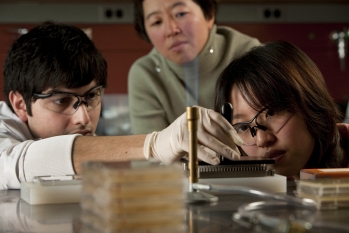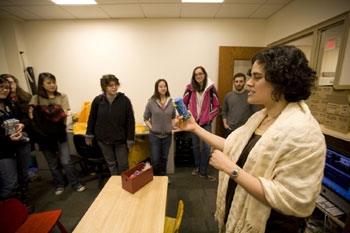COVER STORY
Undergrads seek to change the world through research
(Page 3 of 6)
Maki Inada, center, observes Ryan Clagg '10, left, and Diane Cheng '11 in the lab. Inada, a senior research associate in molecular biology and genetics, teaches a Writing in the Disciplines course (BIOBM/BIOGD 3990: Research Practicum in Molecular and Cellular Biology) that gives undergraduate students experience working on a real research project. Some of the students use the class's lab experience to get undergraduate research assistant jobs from which they were previously turned away. See larger image
The Howard Hughes Medical Institute, for example, has awarded research grants to more than 1,000 Cornell undergraduates in the biological sciences through the Hughes Scholars Program. The program, established in 1990 by HHMI vice president for grants and special programs Peter Bruns (a former Cornell professor), supports nine weeks of full-time research for students in the summer after their sophomore or junior year.
Cornell has long been a leading institution in encouraging undergraduates to do original research, in part because of the belief that it stimulates an increased level of engagement both in their major and in the institution in general. "[Undergraduate research] is ubiquitous. It's in every department, in every college," says Lesley Yorke, projects coordinator in the Office of the Vice Provost for Research.
Undergraduate research also is a vital goal of the current Cornell campaign. Three central campaign priorities are students, faculty and facilities; undergraduate research is a major instance where all three of these priorities converge.

Marianella Casasola, associate professor of human development, holds a student-made research toy for infants during a tour of human development labs held in the College of Human Ecology in February. Undergraduate students interested in research opportunities took the tour to learn about research happening in the college and to talk to professors about future openings in their labs.See larger image
Michele Moody-Adams, vice provost for undergraduate education and herself a former undergraduate researcher at Wellesley College, firmly believes that the process of conceptualizing a problem, figuring out its solution and then making that solution intelligible and accessible to others is an invaluable aid to intellectual development. "[Research] draws on an incredible number of cognitive skills that I think nothing else in an academic setting can," she says.
Many on campus date Cornell's major commitment to undergraduate research to 1996, when Hunter R. Rawlings III, Cornell's '10th president, announced the creation of the Cornell Presidential Research Scholars program through an anonymous gift, providing research support over four years for undergraduates who demonstrate superior academic potential and intellectual curiosity. Rawlings continued to emphasize the importance of involving undergraduates in the intellectual life of the university, especially through research, throughout his tenure as president.